Key takeaways:
- Cannabis expos facilitate knowledge exchange through workshops, personal narratives, and open discussions, enriching understanding of the plant’s benefits.
- Community dialogues are essential for breaking stereotypes and addressing misconceptions about cannabis, fostering empathy through shared stories.
- Creating safe spaces for conversation encourages honesty, allowing diverse perspectives to be shared and understood.
- Following up on discussions and leveraging social media can nurture ongoing dialogues, enhancing community engagement and connection.
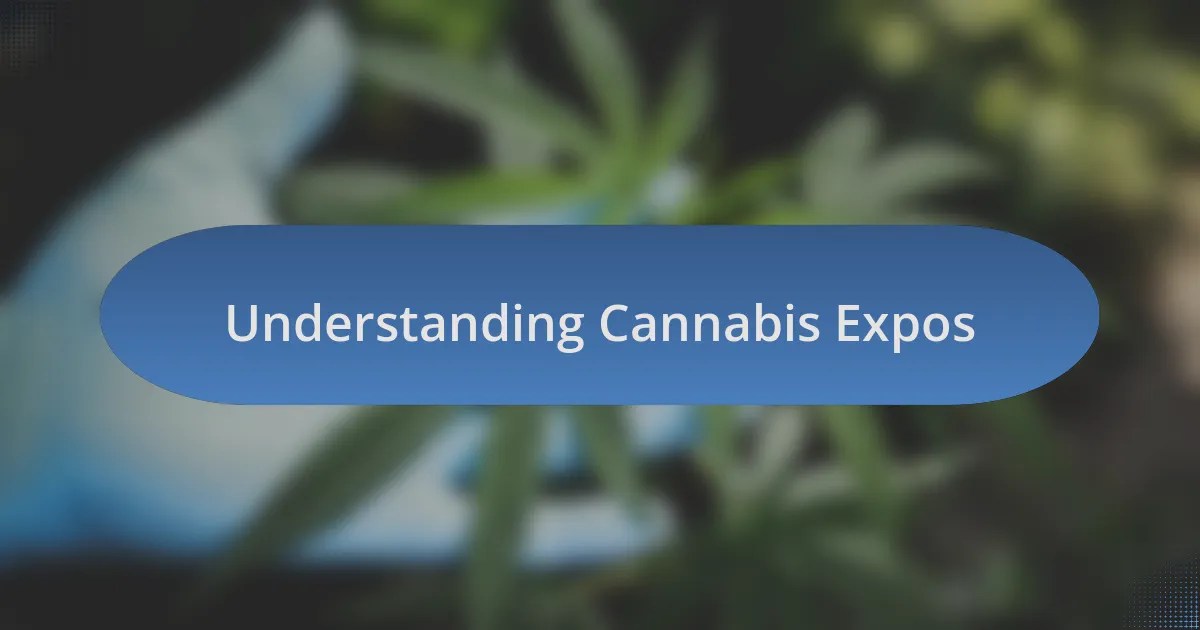
Understanding Cannabis Expos
Cannabis expos are vibrant events that serve as a hub for industry professionals, enthusiasts, and newcomers alike. I remember my first experience; I was instantly captivated by the diverse array of exhibitors, from growers to advocates. It made me wonder, how often do we get to immerse ourselves in a community that shares a common interest so openly?
At these expos, conversations flow effortlessly, creating an atmosphere charged with energy and exploration. I once had a profound chat with a small-scale farmer who shared the story of their journey—struggles, victories, and an unwavering passion for sustainable practices. This personal connection not only deepened my understanding of the industry but also sparked my curiosity about what it means to cultivate responsibly.
What stands out most to me is the wealth of knowledge exchanged in these settings. From workshops to panel discussions, there’s always something new to learn. I often find myself pondering: how much can one conversation change perceptions about cannabis? The insights gained at these events really shaped my perspective, highlighting the importance of dialogue in demystifying the plant and its benefits.
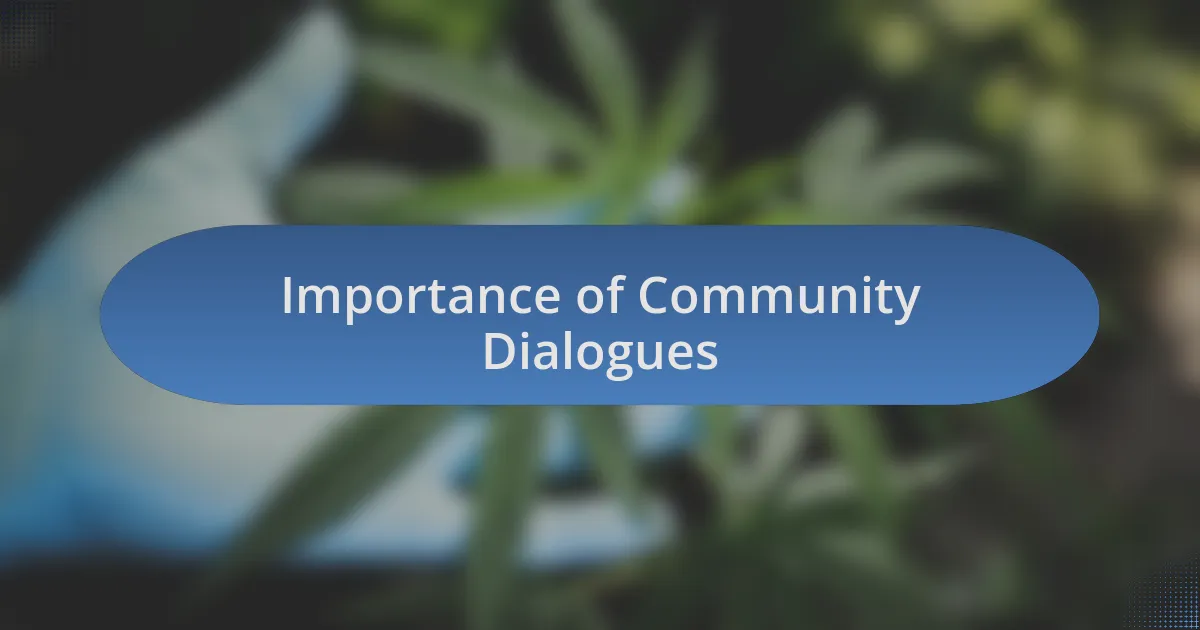
Importance of Community Dialogues
Engaging in community dialogues around cannabis is vital for fostering understanding and breaking down stereotypes. I recall a town hall meeting where local residents voiced their concerns about cannabis regulations. Listening to their fears and questions illuminated just how much misinformation exists. I found myself asking, how can we address these misconceptions if we don’t create a space for open discussion?
These dialogues create an opportunity for people to share their stories and experiences. I remember a conversation with a parent who had initially been against cannabis use but changed their perspective after hearing about its potential benefits for their child’s medical condition. That exchange really highlighted how personal narratives can influence attitudes and foster empathy within the community.
Furthermore, community dialogues help in building relationships among diverse groups. At a recent expo, I connected with activists and entrepreneurs who had varying views on cannabis legislation. It struck me that through respectful conversation, we began to find common ground. Isn’t it interesting how dialogue can transform adversaries into collaborators striving for the same goal of responsible cannabis use?
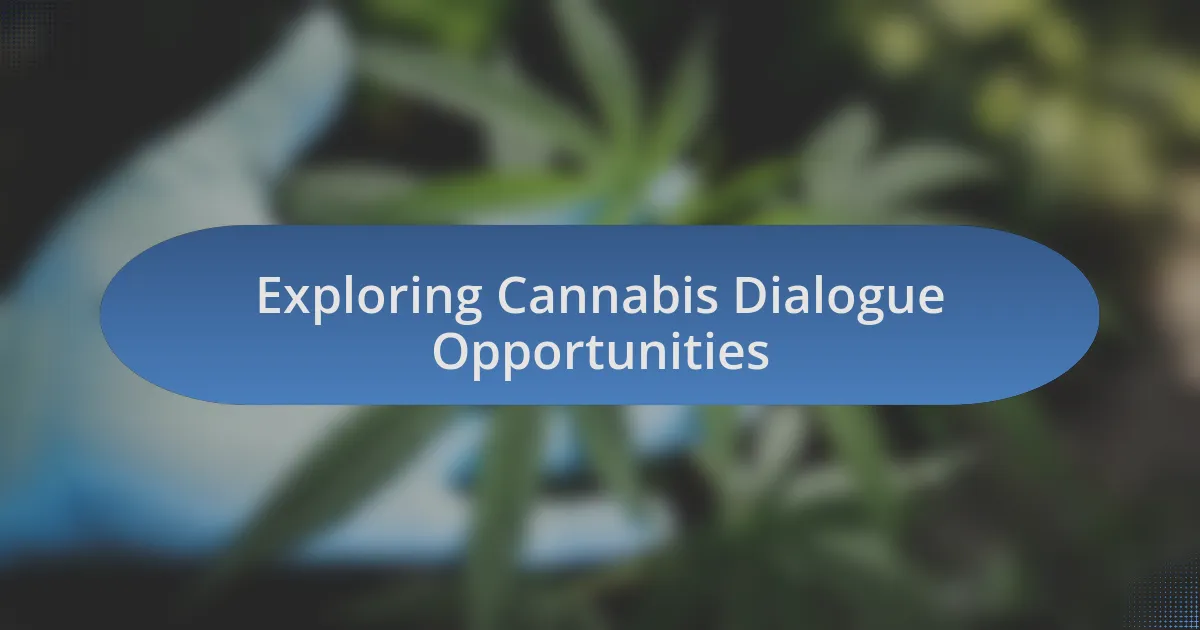
Exploring Cannabis Dialogue Opportunities
When exploring cannabis dialogue opportunities, I find that hosting local workshops can be incredibly impactful. During one such workshop, I witnessed firsthand how participants from all walks of life shared their perspectives. The interactions sparked a genuine sense of curiosity, and by the end, attendees were engaging each other in discussions that seemed unthinkable just hours before. How often do we allow ourselves to step outside our bubbles and really listen to others?
I’ve also seen online forums serve as valuable platforms for dialogue. I remember participating in a virtual panel where experts and community members discussed the benefits and challenges of cannabis. The exchange of ideas was both enlightening and invigorating, as participants were able to share personal anecdotes and data in real-time. Isn’t it fascinating how technology can create these connections and foster a sense of community, even across great distances?
Another opportunity I’ve tapped into are community festivals dedicated to cannabis education. At one festival, I facilitated a booth where people could ask questions anonymously, leading to some surprisingly candid conversations. It highlighted the importance of providing safe spaces for discourse. How often do we underestimate the power of anonymity in encouraging honest dialogue?
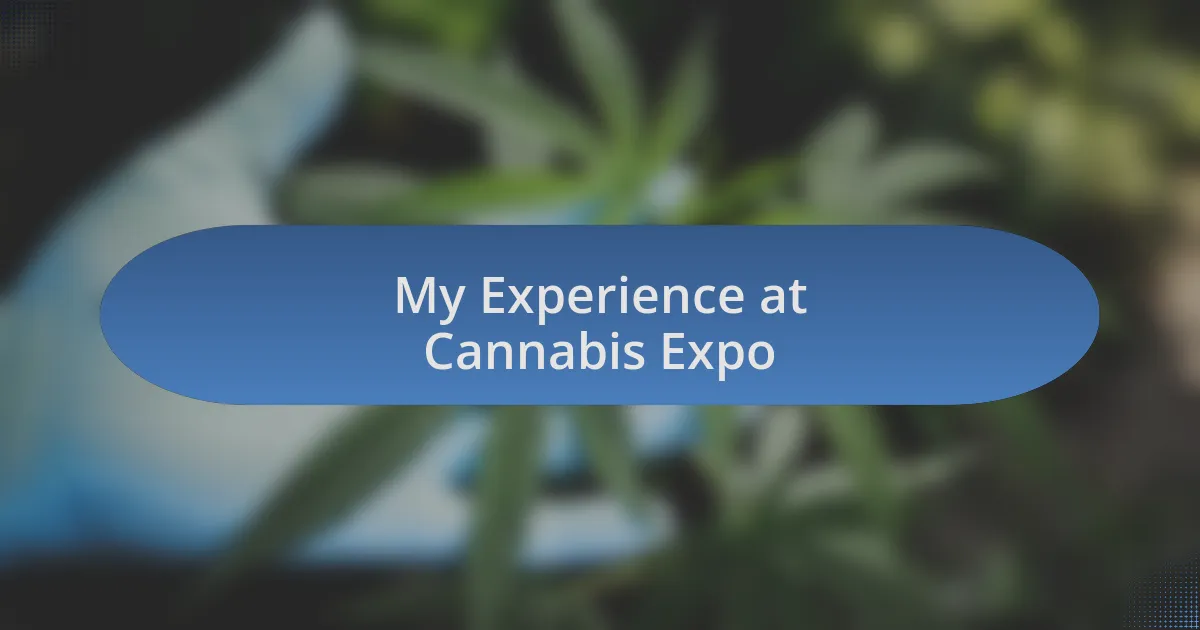
My Experience at Cannabis Expo
I still vividly remember my first experience at Cannabis Expo. Walking through the bustling venue, I was immediately struck by the vibrant energy and sense of community. As I mingled with fellow enthusiasts, I felt an undeniable camaraderie—a shared passion that transcended individual experiences. Isn’t it remarkable how a common interest can unite strangers in such a profound way?
During my time at the expo, I found myself engaging in a particularly eye-opening conversation with a local cultivator. We discussed not only the intricacies of growing but also the role of cannabis in fostering mental wellness. Hearing his story about how cannabis helped him cope with anxiety resonated deeply with me. It made me think, how often do we overlook the personal narratives that shape our understanding of this plant?
Finally, attending various panels was a highlight of my expo experience. Each presentation was a treasure trove of knowledge, showcasing cutting-edge research and diverse perspectives. One speaker shared their journey from skepticism to advocacy, which prompted me to reflect on my own evolving views. Are we not all on a journey of discovery, learning from each other as we navigate this ever-evolving landscape?
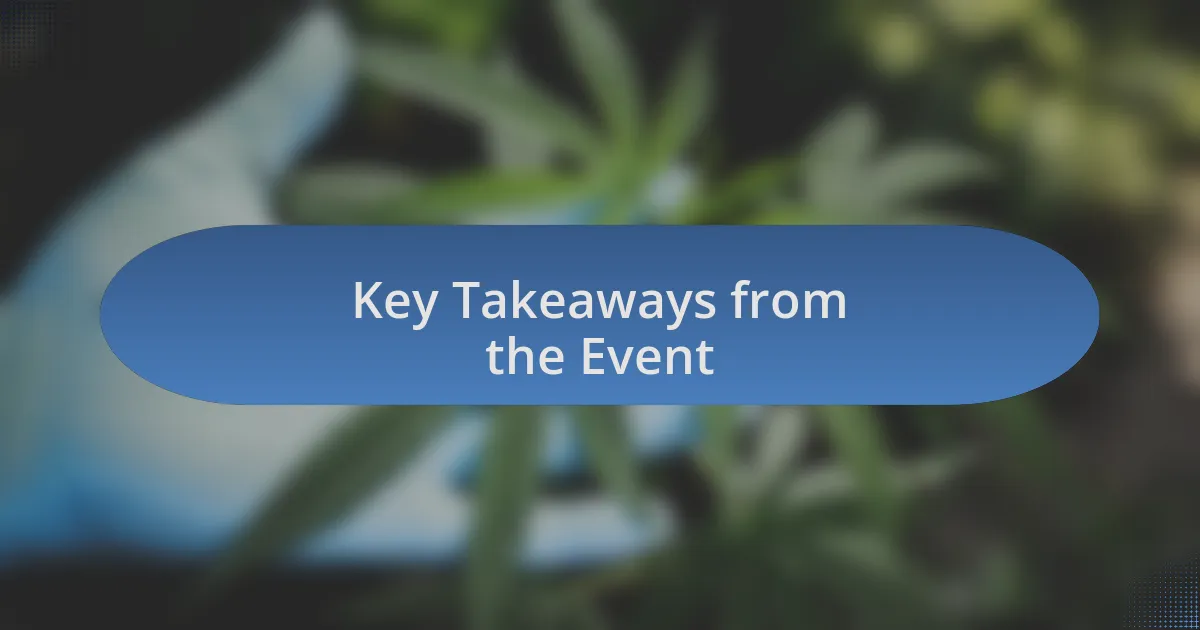
Key Takeaways from the Event
One of the most striking takeaways from the event was the emphasis on community engagement. I had the opportunity to participate in a workshop focused on collective advocacy, where attendees brainstormed solutions to local cannabis policy challenges. The passion shared in that room was palpable; it was a reminder that we all have power to influence change when we work together.
Another key insight came from a panel on the importance of education in reducing stigma. A speaker shared a powerful personal story about being judged for their cannabis use and how education transformed not only their life but also the lives of those around them. Hearing these experiences made me reflect on how vital it is to share our own narratives—aren’t our stories the best tools we have to foster understanding?
Finally, the discussions around mental health and cannabis were particularly enlightening. I encountered numerous people whose lives improved significantly through responsible usage of cannabis for therapeutic purposes. Listening to these heartfelt accounts reinforced my belief that fostering open conversations about these topics can pave the way for greater acceptance and support within our communities. How can we continue to advocate for such important dialogues beyond this event?
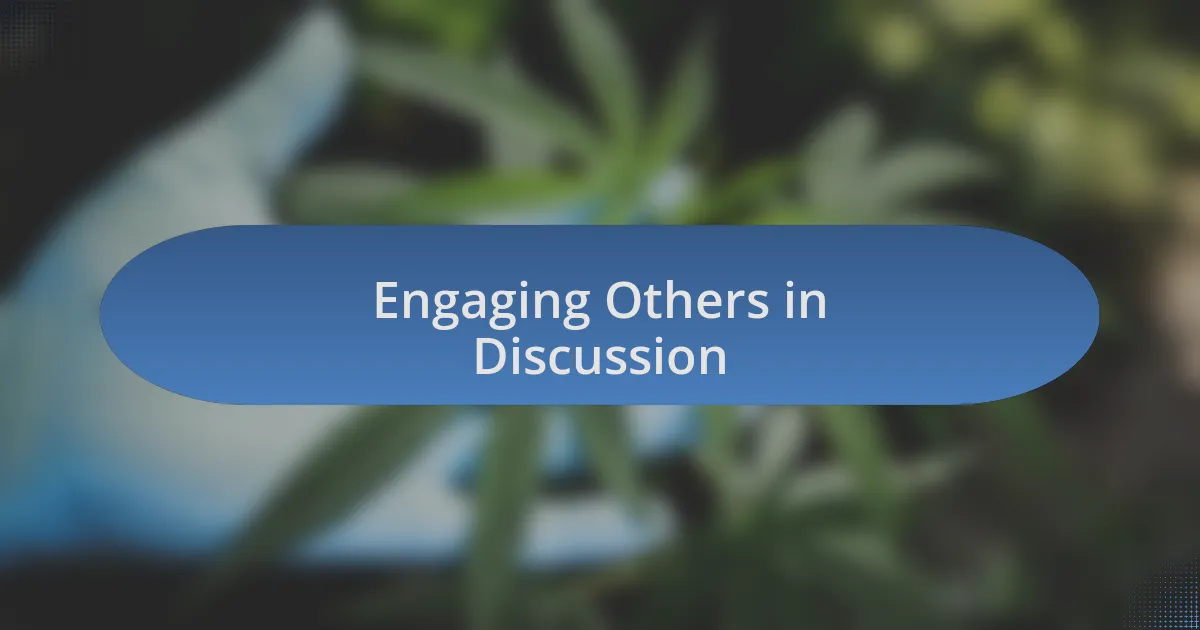
Engaging Others in Discussion
Engaging others in discussion about cannabis can be incredibly rewarding, especially when you share personal experiences. I vividly recall chatting with a neighbor who was skeptical about cannabis. By simply sharing how it helped me with anxiety, I saw their perspective gradually shift. This shows how personal narratives can break down barriers and invite others to open up.
Sometimes, I find that asking open-ended questions can spark deeper discussions. For instance, during a local meetup, I asked, “What’s your biggest concern about cannabis legalization?” The responses varied, but the dialogue encouraged everyone to voice their thoughts without judgment. This approach not only enriches the conversation but helps us understand diverse viewpoints.
I’ve also learned that creating a safe space for dialogue is essential. I once facilitated a roundtable discussion where participants were encouraged to share their cannabis stories freely. The atmosphere was filled with trust and vulnerability, leading to insights that we could never have achieved in a more structured setting. How often do we allow ourselves to really listen to each other? It’s in these genuine exchanges that we can foster a more informed community.
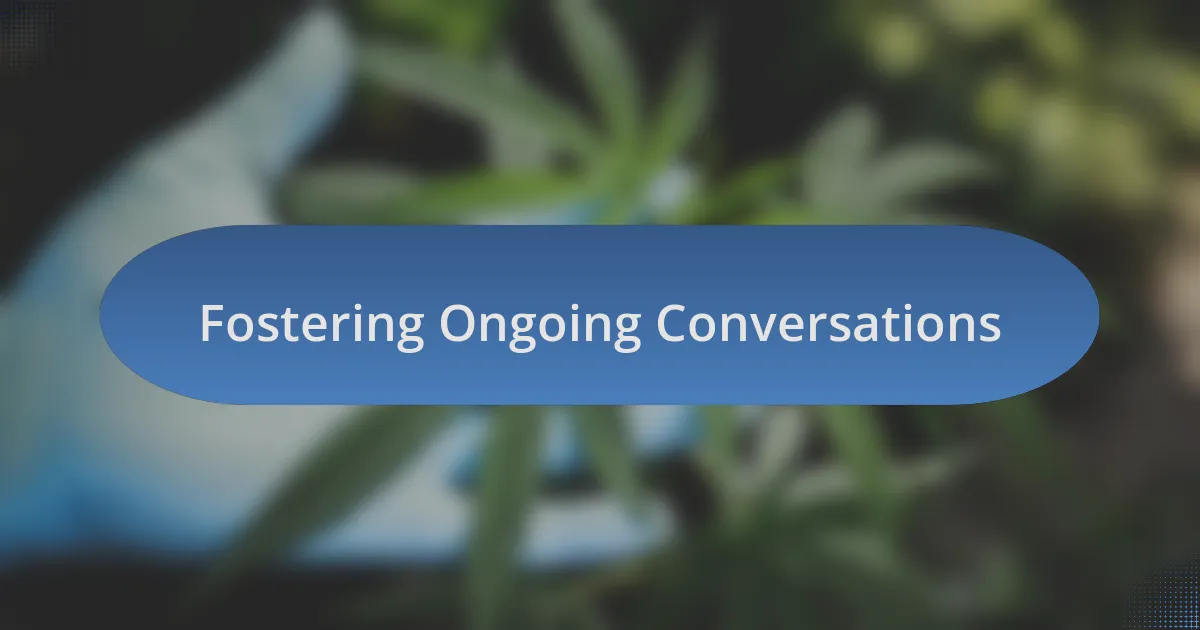
Fostering Ongoing Conversations
Fostering ongoing conversations about cannabis requires persistence and genuine interest. I remember attending a quarterly community forum where cannabis was back on the agenda. Instead of rushing through the topics, we paused to reflect on how new laws had impacted local dispensaries and patients alike. This kind of reflective dialogue nurtured a collective curiosity, sparking conversations that continued well beyond the event. Isn’t it interesting how one discussion can lead to multiple follow-ups?
I’ve found that following up with participants after initial discussions can deepen those connections. After a workshop, I sent a simple email to attendees asking for their thoughts on what we discussed. The responses flooded in, revealing layers of understanding and concern I hadn’t initially considered. By actively seeking their input, I felt I was saying, “Your voice matters.” Have you ever noticed how a simple follow-up email can transform a one-time conversation into an ongoing dialogue?
Moreover, leveraging social media platforms can extend these discussions into everyday life. I once started a Facebook group for local cannabis enthusiasts, where we shared articles, opinions, and personal stories. The group became a hub for ongoing discussion, where members felt comfortable diving into complex topics, from sustainable cultivation to social equity. Isn’t it incredible how online interactions can recreate that sense of community and connection?